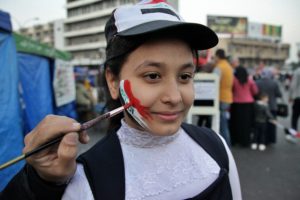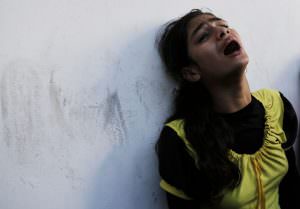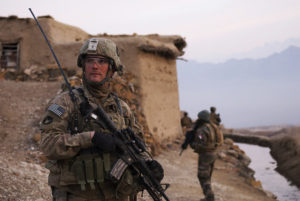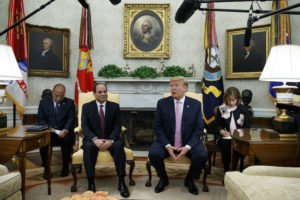Terrorizing a Family of Human Rights Champions
Bahrain, a key U.S. ally in the Mideast, is building a symbolic wall against freedom. Part of that odious effort is the longtime persecution of Abdulhadi al-Khawaja and two of his daughters. Bahraini anti-government protesters run as police fire tear gas to disperse a pro-democracy march after demonstrators began burning debris in the streets of the western town of Malkiya, Bahrain. More than three years after Bahrain's latest uprising began, protests, marches and clashes with police remain almost nightly events in opposition towns throughout the Gulf island kingdom. AP/Hasan Jamali
Bahraini anti-government protesters run as police fire tear gas to disperse a pro-democracy march after demonstrators began burning debris in the streets of the western town of Malkiya, Bahrain. More than three years after Bahrain's latest uprising began, protests, marches and clashes with police remain almost nightly events in opposition towns throughout the Gulf island kingdom. AP/Hasan Jamali
The last time I wrote at length about the remarkable al-Khawaja family of democratic nonviolent human rights activists from Bahrain it was because its members were being nominated as a family for the 2013 Nobel Peace Prize. And excellent winners they would have been, signal torchbearers for the best and most idealistic aspirations evident in the Arab Spring; however, the Norwegian stewards of the prize, who’ve been proving a little squirrelly and unfocused of late (with that premature award for Barack Obama during his first presidential year and their choice of “the European Union” in 2012), instead went for the Organization for the Prohibition of Chemical Weapons last year—ah well.
Alas, the family’s fate has taken a dramatic turn for the worse in recent days and is becoming the subject of worldwide concern and alarm.
The father, Abdulhadi, and his wife, Khadija al-Mousawi, are both longtime Bahraini activists, going back to their college days in the late ’70s, and for their troubles were exiled from the island nation, a longtime repressive monarchy closely allied with the United States, which headquarters its Persian Gulf Fifth Fleet there. They went on to raise their family abroad, first in Syria and then in Denmark, where Abdulhadi founded the highly respected Bahrain Human Rights Organization, and two of their daughters in particular, Zainab (born 1983) and Maryam (born 1987), began growing into powerful presences in their own right (all the family members are now dual Danish-Bahraini citizens). In 2001, when a new emir back in their homeland seemed to usher in something of a democratizing thaw with a general amnesty, the entire family returned to Bahrain and Abdulhadi founded the equally well regarded Bahrain Center for Human Rights and began serving as the Middle East and North Africa protection coordinator for Front Line Defenders (the International Foundation for the Protection of Human Rights Defenders). Ironically so, since quite soon the hard-liners in the Bahraini regime reasserted their authority, the thaw ended and Abdulhadi himself was regularly being arrested, beaten and imprisoned.
Bahrain is another of those former British protectorates in which a minority royal family (in this case the Sunni al Khalifas) is massively privileged over an actively and perniciously underdeveloped majority (mainly Shiite). (For some fascinating background on specifically British involvement in the toxic polity that emerged even following notional independence in 1971, laced with some truly cringe-inducing video footage, see BBC ace archivist/documentarian Adam Curtis’ blog post. The country, with its population of 1.2 million, is today characterized by appalling disparities in wealth — over 600,000 are in fact guest workers, basically indentured servants, whose presence inflicts even further downward pressure on the incomes of the majority Shiites. The country is actually an archipelago of 33 islands, with 30 belonging exclusively to the royal family and its acolytes, and the entire southern half of the main island likewise off limits to the vast majority of the population, most of it jammed into that main island’s northern half, which has the fourth highest population density in the world. There are no public beaches: All the shore belongs exclusively to the royal family, its minions and the U.S. Navy. Notwithstanding that geography and that history, and in no small part thanks to the sorts of activism that Abdulhadi al-Khawaja and his civil society colleagues pioneered throughout the previous decade, when the Arab Spring arrived in Bahrain’s capital of Manama in early 2011 with the so-called Pearl Revolution it was remarkably nonsectarian in character. The demands were for a more constitutional monarchy with greater civil participation across the board. However, this proved way too much for the hard-line elements of the al Khalifa royal family, and their Saudi and United Arab Emirates backers, which on March 14 sent hundreds of armored personnel carriers across the causeway connecting the island to the Saudi mainland to crush the up-to-that-point almost entirely nonviolent uprising.
A few weeks later, on April 9, Abdulhadi himself was arrested and beaten so savagely in the process that he was dragged away unconscious, subsequently requiring jaw reconstructive surgery so massive he now has 30 plates holding his face together. (The operations were successful enough for the military doctors to return him to his jailers for further torture). On June 11, 2011, Abdulhadi and seven other leading human rights and democracy activists were sentenced to life in prison (in response to which Abdulhadi raised his fist and shouted “We shall continue on the path of peaceful resistance!” as he was bustled out of the courtroom).
At that point, his daughters—Zainab (then the mother of a 1-year-old baby, Jude) inside the country and Maryam, outside the country at the time—took up their father’s banner. Zainab proved stunningly fearless in her often one-person acts of civil disobedience, calling attention to the fates of her father, his fellow prisoners and the common citizens increasingly being terrorized by the state police—and regularly was beaten and herself thrown in prison. Maryam, only 24 at the time, for her part became the acting director of the Bahrain Human Rights Center and started traveling the world (five, six, seven countries a month, for months on end), calling on world leaders and parliamentarians (including U.S. congressional committee members) and international agencies to draw attention to the plight of the crushed movements throughout the Middle East. The pincer activism of the al-Khawaja sisters took on added urgency when, in February 2012, their father embarked on what stretched into a 110-day hunger strike, which he was persuaded to abandon only just short of death.
A sense of the family’s fiercely vivid sense of commitment arose later that year in December when Zainab emerged from another of her months-long detentions and immediately resumed tweeting over her angryarabiya Twitter feed:
Your support matters…angry arabiya @angryarabiya
So thats a total of 3 months that I did not see my father, during my 2 months in detention I was allowed one call to my dad #Bahrain.
I dont want to share the difficulties of prison, but I do want to share that one phonecall, when I at last heard his voice I remember running out of my cell when the prison guard told me I cud speak to my father, I cudnt believe it
and I remember as soon as I said hello, I heard another prison guard, on the other side of the phone call, shouting at my father
“Dont speak about politics” he shouted. and I could hear the irritation in the voice of my always proud father
Its always awkward when u have a few minutes 2 speak to some1 u love, with police standing by listening to ur conversation
but my father started with “Listen Zainab, u know they built a wall around our outdoor area instead of the fence”
“we used to be able to see the sea, we could see the first light of the sunrise. But they didn’t want other prisoners to see us”
“The other day I sat with 1 of the other political prisoners, right before the sunrise. He turned to me & started reading a poem”
” ‘How difficult it is, to have a wall, between u and the sunrise. How difficult, to try and claw ur way, to see a little light.’ ”
as my father read me the poem, I felt all the anger and sadness in me come to the surface, yes a wall surrounds us
He waited knowing wat I was thinking, and feeling, then he said “but Zainab I listened to his poem, then asked him not to leave”
“we sat and waited and waited, in complete silence, until the sun was high up in the sky”
“then I turned to my frnd & told him, the sun always rises higher than the wall. ull be in pain, only if u concentrate on the wall”
“But if u look at the big picture, ull realize, that in the end, the wall is infact, insignificant”
* * *
Insignificant or not, the Bahraini wall remained painfully obdurate over the months and years as Abdulhadi continued to molder away in prison, and Zainab for her part likewise ended up spending the better part of 2013-14 in and out of jail. The story seemed to fade from the headlines, in no small part perhaps owing to the $50 million the Bahraini regime lavished on premier PR firms (click here, here and here), notably led by Bell Pottinger in London and Qorvis Communications in Washington, D.C., the latter in strategic alliance with the blue-chip D.C. lobbying and legal firm of Patton Boggs, representing such other excellent regimes as those of Sri Lanka and Equatorial Guinea.
On the other hand, Maryam, now 27 and continuing to travel the world, grew into an ever more charismatic and self-assured champion of Bahraini rights in particular and human rights more generally: uncannily composed, stylish, sly, whip-smart and often disconcertingly funny. See, for example, her star turn on a panel titled “What the Hell Is Going On in Bahrain?” held in May of last year by the New York Institute for the Humanities at New York University (which, truth in advertising, I myself helped to coordinate as director of the institute at that time), a presentation that from approximately the 01:30-minute mark to 37:40 also serves to provide an exceptionally lucid overview of the general situation in Bahrain. Over the past several years I have regularly heard high-level human rights activists predict how within a decade or two Maryam could well be the head of Amnesty International or the United Nations High Commissioner for Human Rights or some such.
Or so people were saying until just a short while ago.
* * *
Late last month, on Aug. 24, Abdulhadi, increasingly frustrated by conditions in his country (suppression increasing, more raids and more arrests and mass opposition in the slums, particularly among the youth) and perhaps hoping to bring matters to a head, announced he would renew a water-and-salt-only hunger strike; soon after he started the fast, his medical state deteriorated with unexpected suddenness — within days his blood sugar level plunged and his blood pressure dropped to 90/55. With fear for his very life increasingly pronounced, his wife and his daughter Zainab were granted a visit with him for Sept. 1. Maryam decided to rush home in hopes of joining them so as to see her father perhaps one last time. Although on an earlier trip she had been stopped at London’s Heathrow Airport (presumably with the collusion of British authorities), this time she made it to Manama airport unimpeded, arriving at 1 in the morning of Aug. 30. There her Danish passport was confiscated and she was detained, stripped of her Bahraini citizenship and led into a small room where she was beaten by four policewomen. Just before her cell phone was seized, she sent out word that she would not leave the country voluntarily and announced she herself was starting a hunger strike with the sole demand that she be allowed to see her father. At which point she was led away, and for several agonizing days nothing was heard of her fate.
Apparently she was the subject of a daylong interrogation without the presence of her lawyer (a violation of the Bahraini constitution), after which she was formally accused of insulting the king on social media, taking part in last year’s worldwide Wanted for Justice anti-impunity campaign, and “assault and battery against on-duty public employees during their performance of official duties.” These are all very serious charges, with insulting the king on social media, for example, carrying a possible sentence of over seven years. She has been remanded to Isa Town women’s prison. After she was finally able to make phone calls she abandoned her hunger strike at the urging of her family, which was concerned over the added stress it was putting on her already frail father. [Editor’s note: After this article was posted, Maryam, on Sept. 12, resumed her hunger strike. Her only demand remained that she be permitted to visit her father, who as of that date was continuing his own fast.]
In a statement issued a few days after Maryam’s arrest, the Gulf Center for Human Rights cited “an extremely high degree of urgency for this case and serious concern over the safety and wellbeing of Ms. Al-Khawaja in detention, particularly considering the history of abuse to which the family has been subjected.” Several other international bodies chimed in with their concern.
Meanwhile, Human Rights Watch posted a dispatch — authored by Nicholas MacGeehan, the organization’s head Bahrain, Qatar and UAE researcher — placing the onus for this entire situation where it truly belongs:
Bahrain’s western allies bear significant responsibility for the worsening situation in Bahrain and for the calamitous circumstances facing activists in the country, including Zainab, Maryam and Abdulhadi. Had the UK, the US or the EU exerted real pressure for Abdulhadi al-Khawaja’s release and the release of other high-profile dissidents whose only “crime” has been to call for political reform in the country, Abdulhadi might not be on hunger strike, and his daughter might not be in Isa Town prison awaiting a hearing to decide her fate.
Instead, Bahrain’s allies have opted for a disastrous policy of appeasement and acquiescence, and they have remained largely silent in the face of human rights violations that they would loudly denounce were they taking place in a less strategically important country.
As a result, Maryam al-Khawaja is facing imprisonment, and her father’s life is at risk. It is long past time for Bahrain’s allies to show an ounce of the courage the al-Khawajas have shown and stand up for them and the rights they defend.
On Sept. 6 a brief hearing before a judge was finally held. Many had hoped that at the hearing the Bahraini authorities, faced with the condemnations of Maryam’s arrest (albeit still distressingly muted ones from the U.S., which mainly called for due process to be observed), might think better of things and just expel Maryam from the country. Instead she was remanded back into custody for further investigation, with another hearing set for a week from now. Abdulhadi’s hunger strike entered its third week a few days ago. Zainab, although currently at liberty, is likewise facing renewed prison time on a raft of outstanding charges (she incidentally is pregnant, with the child, her second, due in November).
On Wednesday of this week, as it happened, career diplomat William Roebuck was on Capitol Hill facing a Senate confirmation hearing on his appointment as U.S. ambassador to Bahrain. Brian Dooley of Human Rights First was there in part to see what the ambassador-designate would say about the al-Khawaja situation. In his opening statement Roebuck said he was going to be prioritizing the “counterterrorism partnership” with the Bahraini regime and went on to declare he would offer continued support “for King Hamad’s efforts to bring reform” to the country, to which Dooley tweeted “Uh-oh.”
Roebuck made no mention of the Al-Khawajas in his statement, but Maryam was the subject of the very first question from the committee chairman, Sen. Tim Kaine. Roebuck’s answer hewed closely to the standard State Department playbook. He promised to “watch the situation closely” but declined to condemn Maryam’s arrest outright or demand her release (as have the foreign ministries of many European governments in addition to the international agencies). Other senators brought up other recent outrages: the refusal of the Bahrainis to allow a visit by Rep. Jim McGovern, or their outright expulsion of Tom Malinowski, the undersecretary of state for human rights, a few months back because he had the temerity to meet with opposition figures. Roebuck described this last as “a surprise” and said it was still the subject of a good deal of discussion.
Remember: Bahrain is one of our principal allies: Our Fifth Fleet is stationed there, at the cost of billions of U.S. taxpayer dollars annually, with the key mission of extending a security umbrella to the regimes of Bahrain, the UAE and Saudi Arabia. Maryam was beaten and is being held in prison in part for the testimony she offered on several occasions over recent years at the invitation of congressional committees and the State Department.
It fell to Sen. Marco Rubio to wonder aloud whether it still made sense for us to be stationing the Fifth Fleet in Bahrain, given how the place was becoming “a long-term powder keg,” one where we are “seen to be looking the other way on repression.”
It will be interesting to see how the PR companies Qorvis and Patton Boggs and, oh yeah, for that matter, President Obama respond in the days ahead.
As far as the latter goes, there were these stirring words as the president concluded his televised address to the nation not 12 hours later:
America … is helping Muslim communities around the world not just in the fight against terrorism, but in the fight for opportunity and tolerance and a more hopeful future. America, our endless blessings bestow an enduring burden. But as Americans, we welcome our responsibility to lead. From Europe to Asia, from the far reaches of Africa to war-torn capitals of the Middle East, we stand for freedom, for justice, for dignity. These are values that have guided our nation since its founding. Tonight, I ask for your support in carrying that leadership forward.
No doubt the al-Kahwajas and many other beleaguered Bahrainis will be thrilled to hear the news.
* * *
A few days ago, Zainab and her mother finally got a half-hour in-person visit with Maryam. Zainab’s account, over her angryaribiyah Twitter feed, was as fierce and uncompromising as ever:
After dozens of phonecalls, going to the public prosecution, airport security & detention center, we finally got a 30 minute visit today
2day, prison guards led us to a visiting room, we were shocked to c a waist high marble partition was to separate us from Maryam
As Maryam was led into the room from another door, with a prison guard on each side, we realized all we cud do was shake her hand
You dream of embracing those u love after being apart for so long, we had to stretch out our arms just to hold her hand
Maryam remained standing & the 1st words that came out of her mouth were ‘How’s dad?’ My mother replied that he had ups and downs
“I’ve requested a visit to see him, I’ve asked for a phone call at least, but they haven’t given me any reply,” Maryam said
My mother told her that our father had done the same, & had told us in the last visit of the many requests he made to see Maryam
Maryam still has a lot of pain in her shoulder from her arrest she told us, but then she looked @ my mums worried face & said
“I’ll be okay Mum, I’m already teaching six other detainees English, trying to keep myself busy”
No matter what the circumstances Maryam can always make us laugh.
I was telling some detainees how much I love Bahrain. One Egyptian detainee looked at me baffled. She said: “Maryam
“As soon as u got to the airport they insulted, attacked, handcuffed & arrested u!” Maryam laughed and said, [written in Arabic, “My country, even when it savages me, it remains dear to me”—a line from a famous poem].
The 2 prison guards stood up, visit already over. Maryam looked at us 1 by 1. “Are you SURE dads okay?! U wudnt hide anything from me?
We all have a heavy feeling… he’s on the eleventh day of a hunger strike, he’s not ok & we all know it’s only going to get worse
Be4 we left Mum looked at the prison guard & asked “Can I hug my daughter?” “No” came the reply
“You’re a mother, or someday u will be, & u’ll never forget this moment” my mother told the female prison guard, who looked away
My mother pulled a chair, got on the marble partition, stretched herself until she cud hug Maryam.
The mother, sunlike, rising over the wall.
Zainab ended her Twitter account with these words:
“To participate in a struggle for freedom, to sacrifice for liberty, is an honor not a tragedy.”
A petition addressed to U.S. Secretary of State John Kerry, demanding more forceful American diplomatic action on behalf of Maryam and her fellow Bahraini human rights prisoners, is being circulated online. Click here.
Independent journalism is under threat and overshadowed by heavily funded mainstream media.
You can help level the playing field. Become a member.
Your tax-deductible contribution keeps us digging beneath the headlines to give you thought-provoking, investigative reporting and analysis that unearths what's really happening- without compromise.
Give today to support our courageous, independent journalists.






You need to be a supporter to comment.
There are currently no responses to this article.
Be the first to respond.